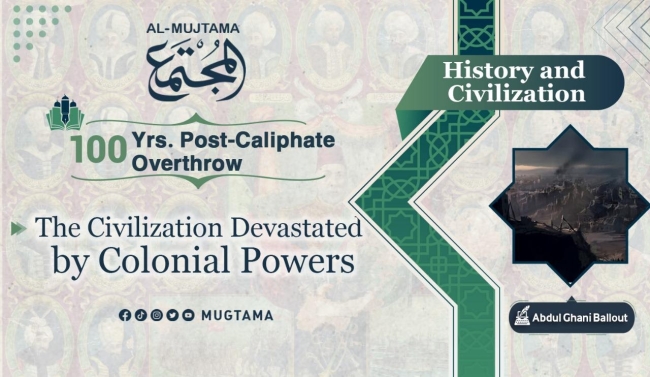The Civilization Devastated by Colonial Powers
The Moroccan academic Noureddine Belhaddad described the fall of the Islamic Caliphate a hundred years ago as a “violent earthquake” that struck the Islamic Ummah, shaking its foundations and tumbling it to the lowest depths. With this collapse, Muslims lost their strength, courage, and political and social unity, as well as the economic and military status that had lasted for several centuries. Meanwhile, the world lost a refined civilization, the best of which was on its way to being handed out to all of humanity.
The professor of modern Moroccan history highlighted in an interview with “Al-Mujtama” that the Islamic Caliphate, undermined by external ambitions seeking to limit the Islamic superiority in various fields over centuries—scientifically, culturally, and militarily—experienced its downfall due to internal weaknesses. These weaknesses were manifested in the oppression of some rulers of Islamic countries and their rivalry over power.
Weakness After Strength
Belhaddad mentioned how this Islamic Ummah was once a center of radiance in knowledge and civilization, expanding and flourishing while imposing its strength on the world. Even the Christian West trembled at the passage of the Islamic Caliphate's ships. However, with the Western states' ravage and the expansion of their ambitions, we witnessed Islamic territories rapidly falling into their hands due to weakness after strength, injustice after justice, humiliation after pride, fragmentation after unity, and a focus on personal interests instead of the common good.
Belhaddad: Muslims lost political, social, economic, and military unity with the fall of the Caliphate
The Moroccan researcher linked the past to the present, highlighting how enemies of the Islamic Ummah today collaborate to keep it in a state of weakness and degradation. He pointed out that the ongoing war on Gaza is prominent evidence of this conspiracy, aimed at erasing and obliterating the identity of Islamic nations.
Belhaddad emphasized that Muslims will not regain their power unless their leaders unify, allow their people to express their aspirations and creativity in all fields, and prioritize education. He stressed the importance of embracing the factors of industrial, technological, and moral progress while focusing on the history of the Islamic Ummah and its early development and flourishing.
Overthrown, Not Fallen!
Academic Moroccan Mohamed Kharoubat affirmed that the Islamic Ummah today reflects on the centennial anniversary of the overthrow of the Islamic Caliphate. He clarified that the Caliphate did not just fall; rather, it was overthrown. This overthrow represents the “catastrophe of the Ummah” in the modern era. The aftermath of this fall has only led to further fragmentation and collapse. No Islamic country is immune to the troubles of sectarianism, factionalism, and separatist movements, as enemies of the Ummah have fueled tensions among different schools, sects, beliefs, accents, and so on.
Kharoubat: The Caliphate was overthrown, not fallen, and the Ummah suffered nothing but more fragmentation, collapse, and division
The researcher in Islamic civilization highlighted in a statement to “Al-Mujtama” that the Islamic Caliphate, which fell in 1924, is not a negotiable option or a political system, but rather a religious demand. Allah intended this ummah to be a unified entity under one banner. Its unity, worship, and dignity among nations can only be maintained through unity. There is a noteworthy equation to illustrate this: as the nation becomes more fragmented, its enemies become more united. It is as if the destruction of the Ummah's unity is the cause of its enemies unity, and in return, the unity of those enemies is the cause of the collapse of the Ummah’s unity.
Kharoubat added that the Islamic Ummah today is influenced by a culture of fragmentation and disintegration. This culture is actively contributing to the Muslims destroying their unity, uprooting the foundations of their identity, and opposing the factors that uphold their existence.
-------------------------------------------------------------


